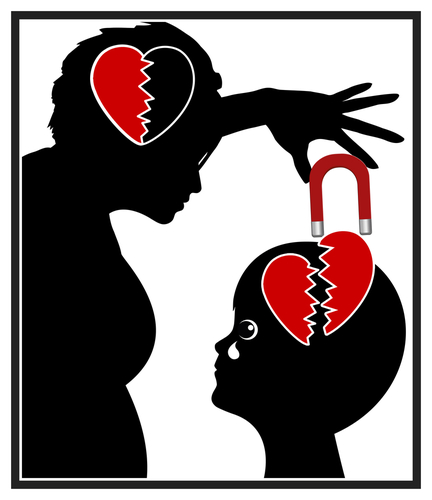If you were raised in a household where narcissistic practices were a constant, it’s natural for you to ask yourself, “Am I a narcissistic parent?” You may wonder how much of your parent’s behaviors and attitudes you inherited.
The very fact that you are questioning your actions toward your kid is proof you are not automatically a self-absorbed parent yourself. Narcissistic parents usually do not doubt their way of doing things, as they consider it to be the only right way to do them.
If you recognize some of your parents’ attitudes and behaviors in yourself, you may experience guilt or confusion regarding your role as a parent, but that doesn’t necessarily mean you became a narcissist yourself.
Below are four of the most common characteristics of a narcissistic parent in order for you to answer some of your parenting-related questions or to better understand your own childhood experience.
Four Characteristics of Narcissistic Parents
1. Closed to dialogue
Narcissistic parents are highly intolerant to a different point of view and are not open to receiving any feedback on their behavior. They rarely acknowledge their behavior as a contributor to problems (Duffy & Jaquin, 2017). They tend to become offended by remarks others make about them and can react aggressively.
In relationships with their child, narcissistic parents are not willing to listen and understand their kids and are deeply self-absorbed. This interpersonal encounter leaves no space for the child to explore and form an identity.
2. Lack of empathy
Their sense of entitlement and grandiosity make narcissistic parents unaware of the needs and emotions of others.
They frequently use hurtful language, act inappropriately, and tend to cross boundaries. This may present itself in disproportionate reactions to rejection, controlling behavior, the attempt to socially isolate their children, and a lack of consideration for their feelings and expressions.
People who were raised by parents with narcissistic tendencies may recall criticism and inconsiderate behaviors as part of the parenting they received.
3. Inconsistent behavior
As stated by Rappoport (2005), narcissistic parents tend to be intrusive and controlling in some aspects of their children’s lives and completely neglectful in others.
Usually, they try to impose their choice or opinion on decisions that will affect their child’s social status and are absent when it comes to their emotional needs. Also, narcissistic parents could seem warm and helpful at times, if that serves them a certain purpose, and switch back to control.
These actions leave children confused and insecure, and with the sense that they cannot count on their parents for support.
4. Use of punishments
Narcissistic people are entirely intolerant to others’ points of view and they will punish their children when their thoughts or actions don’t fit within that window of tolerance.
The punishments can come in various forms, from physical and verbal abuse to intense outbursts of anger or emotional withdrawal. A typical punishment may be the use of guilt and emotional manipulation that makes the child openly responsible for their parent’s comfort.
Narcissistic parents use these punishments in order to alter their child’s behavior to match their requirements and not challenge their view (Rappoport, 2005).
Alan Rappoport (2005) affirms that we are all narcissists or co-narcissists (finding excuses and complying with the narcissist’s requirements) to some degree and at certain times.
As a parent, you may find yourself behaving more controlling than you’d like to or being less empathetic and nurturing than what you’d expected. It is normal for those moments to exist and they usually are not devastating for your child’s development.
The trouble appears when those behaviors and attitudes are constant in your life and they interfere with your and your child’s daily wellbeing.
Join the community to get more articles like this one delivered straight to your inbox.
If you like this article, you’ll also enjoy these:
- What Narcissistic Parents Say to Crush Your Self-Worth
- What is Gray Rock? How to Deal with a Narcissist
- 7 Narcissist Lies That Are Easy to Spot
- Divorcing a Narcissist: How They Use the ‘System’ Against You
- How Your Narcissistic Mother Affects Your Relationship
- The Unlucky 13 Different Types of Narcissism
Sources
Roppoport, A. (2005). Co-Narcissism: How We Accommodate to Narcissistic Parents. The Therapist
Duffy, L., J., and Jacquin, K., M. (2017). The Psychological and Legal Risks for Children of Narcissistic Parents. Fielding Graduate University, American College of Forensic Psychology.





